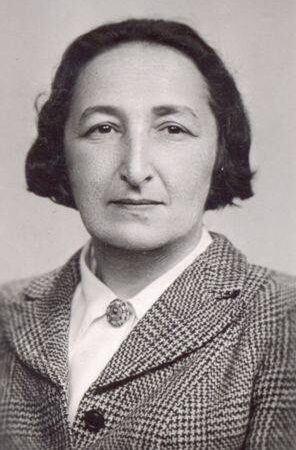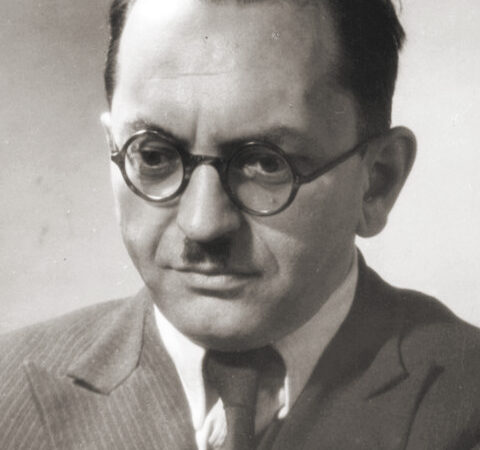Lidia Ciołkoszowa – life in the shadow of politics
A major activist in the Polish Socialist Party, charismatic, energetic, skilled opponent of both fascism and communism, Lidia Ciolkoszowa was born as Lidia Kahan on 24 June 1902 to an assimilated Jewish family with strong patriotic traditions.
In the Kahan home, the (then illegal) “independence newspapers” were read, and the cult of uprisings and national heroes was nurtured. The idol of the adolescent Lidia was Józef Piłsudski. Years later she recalled: “The legend of the fighters brought me to the Socialists. It was an independence, freedom and democracy faction”.
She spent her childhood in Łódź – a city full of contrasts. Fast-paced careers in industry were a counterpoint to widespread poverty. Lidia’s mother, Estera Najfeld, was very involved in charity events, which she encouraged her daughter to participate in. The most important of these was the ‘Milk Drop’ – a social initiative, begun in 1904 in Lodz, to collect valuable milk from breastfeeding women in order to donate it to the poorer residents of that city, who, due to economic conditions, had no food for their infants.
The values of the family home had a great influence on Lidia, who grew into a charismatic and effective activist. Her first public patriotic speech was her participation in a demonstration on the anniversary of the 3rd of May Constitution. Fourteen years old at the time, she was already a committed Girl Scout. In 1920, during the war with the Bolsheviks, she set up a School Committee to help soldiers by repairing linen from military hospitals.
During her studies, she enrolled in the Polish Socialist Party. As a young socialist, she strongly opposed both fascism and communism: she devoted her doctoral thesis, defended in 1925, to political and social motifs in the works of Stefan Żeromski, her favorite writer, whom she valued for his radical anti-communism. “When I defended myself, my friends gave me a large portrait of Żeromski, which hung above my bed until the war,” she narrated.
In the same year, she married Adam Ciolkosz – a Pole, a socialist, a participant in the battles for Lvov, the Third Silesian Uprising and the Polish-Soviet War, a PPS man determined to “order the world differently”.
Lidia and Adam Ciolkosz
The May coup of 1926 came as a shock to Polish socialists. At first they supported Józef Piłsudski, because they considered him ideologically close to them, a former PPS fighter. But instead of implementing the social reforms proposed by the left, Piłsudski sought to consolidate his position in the state. As early as 1927, PPS activists were under no illusions about Sanacja’s policies, and became opposed to them. In reaction, Lidia then threw out her large portrait photograph of Piłsudski!
In 1928, Adam Ciołkosz became one of the youngest and most active MPs in the Polish Sejm. He fought against the old electoral law in Galicia and supported workers’ protests. In 1930 Ciołkosz became an important figure in the Centrolew, organizing the great opposition Congress for the Defense of the Right and Freedom of the People. His activities, however, came at a price: On 18 June 1930 he was brutally beaten for political reasons, and a few years later, as a result of the Brest Trial in 1932, he was imprisoned for three years. Lidia repeatedly said that she had always lived in her husband’s shadow, but this was not true. Her activities were no less important than those of her husband.
Lidia worked socially at the Workers’ University Society and the Workers’ Society of the Friends of Children, and organized camps and day-care centers for the youngest. And when Ciolkosz was arrested for his activities against Sanation and sent to the fortress in Brest, it was she who took over his duties in the PPS.
She ran her husband’s very successful election campaign in Tarnów, where he was elected with a record 65,000 votes. She then made use of her pedagogical and organizational activities among the children of the Tarnów workers, whose parents, satisfied with her work, eagerly voted for Lidia and her husband. Having taken on a new role, she fought for better conditions for the unemployed and improved transport in the city. From then on, she was a permanent member of the PPS Supreme Council.
Professor Andrzej Friszke wrote: “This position was not given for being the wife of an MP. It is a promotion to the top political elite. She had talent as a leader, she was energetic, focused on achieving her goals. But also very warm. She instantly builds authority among her husband’s colleagues, and they are mostly men.” No wonder, then, that Lidia Ciolkosz was soon already a councilor in Tarnow.
Her dynamic political career is all the more impressive because it developed despite the growing anti-Semitism in Poland. Ciolkosz recalled a meeting with a fellow student in the 1930s, a close associate of Roman Dmowski, Tadeusz Bielecki, to whom she said without reluctance: “Well, how are we supposed to walk around Warsaw now, you with your Chrobry sword in your lapel and me with my nose”. The ‘compliment’ her husband heard from the Tarnów workers was also bitter: “We have a request to make to you, Comrade Ciolkosz: don’t send us any Jews as speakers, it is best to always let Comrade Ciolkoszowa come”.
Four years before the outbreak of war, the Ciołkosz family moved to Kraków, where they became socially involved with Wanda Wasilewska and Józef Cyrankiewicz. Adam remained politically engaged in the PPS, while Lidia worked at the Kraków Workers’ University Society, the People’s University and the Workers’ Society of the Friends of Children. As in Tarnów, she organized and ran camps for children from poor workers’ families. She earned her living working in a lawyer’s office.
In December 1938, Adam took part in local government elections. During the campaign he fought against the National Democrats: “They are the Polish version of Hitlerism! They call for a Great Poland, but they want a small Kraków, where all the windows would be broken and half the people would be walking around with their heads covered in blood from the blows of National Democracy baton-wielders. Endecja is a party of stinginess and spiritual littleness”. Here he also collaborated, as in Tarnów, with the Jewish socialist party Bund. Both the PPS and the Bund were left-wing parties fighting both Sanation (Sanacja) and National Democracy (Endecja). Together with Lidia, they won the Krakow municipal elections.
In the summer of 1939, Lidia organized the very last camps for workers’ children, a few weeks later – the war broke out. “The outbreak of war found me alone, with my ten-year-old son Andrzej, in Krakow,” she recalled. – I was anxious about my husband’s prolonged absence. It wasn’t until Sunday evening that my friends and I set off on a refugee trek across Poland, again and again under German bombs”. They managed to escape at the last minute. The next day, the Gestapo entered their Krakow flat, intending to arrest them.
The Polish government-in-exile ordered the Ciolkosz family to flee to France, where they arrived (separately) in February 1940. Then – with the whole family already there – they emigrated to Great Britain. He became a member of the National Council, she worked for the PPS Foreign Committee. They both disagreed with the policies of Władysław Sikorski, whom they accused of anti-democratic beliefs. They were painfully punished; Adam lost his political position for a time. Lidia had to support the whole family on her own, working on the board of the World Union of Poles Abroad ‘Światpol’.
An important element of the Ciolkosz family’s political activity dealt with Jewish causes. In emigration, an important point in Lidia’s husband’s political program was to denounce the forced emigration of Jews from Poland. They also alerted all parties of the Socialist International very early on to the extermination of the Jewish population. In 1942, they organized a ceremony at Caxton Hall to present the case for the criminality of the German actions. Tragically, almost all of Lidia’s family were killed during the Second World War – only one brother survived.
In May 1945, the war ended, Germany and its allies were defeated.
“We listened to Churchill, the English cheered, I wept bitterly, Adam stood despondent,” said Lidia.
In May 1946, an old friend, also a PPS activist, Józef Cyrankiewicz, visited them in London: “When I opened the door to him, he burst into tears”, she reported. The anti-Communist views of the Ciolkosz family prevented them from returning to Poland. However, they never accepted British citizenship.
After the war, they supported themselves through her work at ‘Światpol’ and the United Women’s Association, and through Adam’s work as a journalist. For many years they were active in Radio Free Europe and Paris Culture – Lidia edited many Polish books published in exile. In 1960, as a result of intrigues, they were expelled from the PPS. They then created their own faction called the “left current”.
In the post-war period they published many pamphlets and books on Polish socialism. Their life’s work was to be the compilation of “Zarys dziejów socjalizmu polskiego” (Outline of the history of Polish socialism) However, only two volumes of the planned five were produced. They kept abreast of events in Poland, where their name was banned by the authorities, and maintained contacts with pre-war PPS activists. They were also involved in opposition activities.
In 1968, Lidia publicly stood up for the writer Paweł Jasienica, who was being attacked by the First Secretary of the PZPR, Władysław Gomułka. They actively supported the Workers’ Defense Committee formed in 1976, and later supported Solidarity activists. They were always happy to host oppositionists and researchers from Poland in their London home. They created a fund for domestic aid. After her husband’s death, Lidia chaired the Fund and took over the leadership of the émigré PPS.
“I think that the tradition of the PPS is alive in the Polish people,” she said on Radio Free Europe. – You can see it from the manifestations, which to me are totally unusual. People involved in the resistance movement who have never known us – neither me nor my husband – when they come to London want to come and talk to me about the PPS and the old days. I think this is thanks to the Polish Socialist Party bringing up workers before the war in the anti-communist and independence tradition. From the traditions of the PPS to contemporary Poland it will be possible to transfer above all the great generosity in matters of national independence and defense of the Republic. This was put into the heart by the PPS in the Polish workers”.
In 1990, she came to Poland for the first time since the outbreak of the Second World War. She met with Prime Minister Tadeusz Mazowiecki. She also took part in the XXV PPS Congress, which saw the formal unification of the émigré and domestic PPS. She was also the last surviving member of the pre-war PPS leadership to be elected Honorary Life Chair of the Party.
“I was profoundly affected by the PPS Congress. Despite my deep satisfaction with the unification of the PPS and with the political achievements, I could not tear myself away from the past, from the memories of the closest people from the former Congresses, and the absence of Adam was felt very painfully.”
What was unacceptable, however, was the cooperation that the PPS party had established with the post-communists (SLD). With regret, she dissociated herself from the PPS: “Communism destroys freedom, democracy, freedom of discussion and opposition, spreads terrorism, leads to mass enslavement of people, to misery and then also to the creation of a great system of slave labor. We were ‘independencists’; we fought for change, but within the framework of an independent Polish state. Meanwhile, the communists wanted a Polish Republic of Councils within the Soviet Union”.
In 1996, she moved into the Fr. Maximilian Kolbe Polish nursing home in London. “The Last Independent” died two weeks before her 100th birthday.


